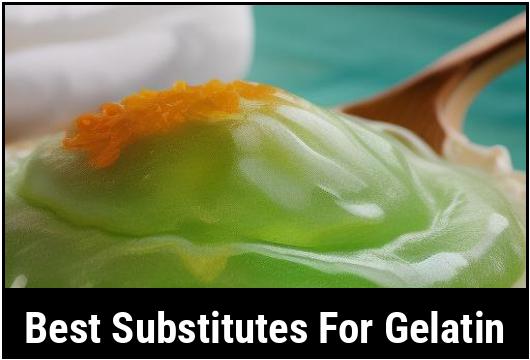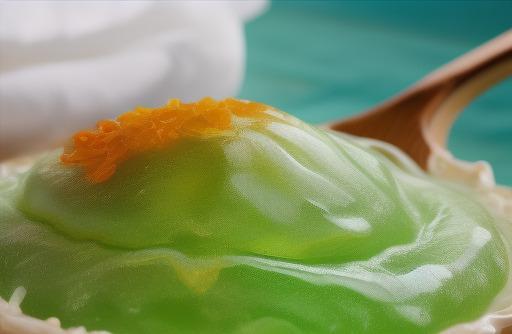- You are here:
- Home »
- Food Substitutes
- » Best Substitutes For Gelatin
Best Substitutes For Gelatin

Gelatin is a common ingredient used in many recipes for its binding and thickening properties. It is derived from collagen and is widely used in desserts, gummies, and jellies. However, if you are a vegetarian or avoiding animal-based products, you may need to find a suitable substitute for gelatin.
Thankfully, there are several alternatives to gelatin that can offer similar texture and binding capabilities without the use of animal products. In this article, we will explore the best substitutes for gelatin and how to use them in your recipes.
Key Takeaways
- Gelatin is commonly used as a binding and thickening agent in recipes.
- Vegetarians and those avoiding animal-based products may need a substitute for gelatin.
- There are several alternatives to gelatin, such as agar-agar, carrageenan, pectin, and konjac powder.
- The right substitute depends on the recipe and desired texture.
- Substitutes for gelatin can be used in a variety of recipes, including desserts, gummies, and jellies.
Why You Need A Substitute For Gelatin
While gelatin is a versatile ingredient, it is derived from animal collagen, typically from the skin and bones of pigs or cows. This can be problematic for people following a vegetarian or vegan diet, or for those who don’t consume animal-based products for ethical reasons.
In addition to dietary restrictions, some people may have allergies or sensitivities to gelatin. Alternatively, you may simply want to explore different options to add variety to your recipes. Whatever the reason, finding a suitable substitute for gelatin is essential.
Types Of Substitutes For Gelatin

There are several alternatives to gelatin that you can use in your recipes. These substitutes offer similar binding and thickening properties, making them suitable replacements for gelatin. Here are some common substitutes to consider:
-
Agar-Agar: Agar-agar is a plant-based gelatin substitute derived from seaweed. It is transparent, odorless, and tasteless, making it ideal for a wide range of recipes. Agar-agar sets at a higher temperature than gelatin, making it suitable for warm or hot preparations.
-
Carrageenan: Carrageenan is another vegan-friendly option made from seaweed. It is commonly used as a thickening agent and stabilizer in food products. Carrageenan can form a gel-like texture similar to gelatin when combined with liquid.
-
Pectin: Pectin is a natural fiber found in fruits, particularly in citrus fruits. It is frequently used as a thickening agent in jams and jellies. Pectin can also be used as a substitute for gelatin, although it may not set as firmly.
-
Konjac Powder: Konjac powder is made from the root of the konjac plant. It is often used as a vegan substitute for gelatin due to its gelling properties. Konjac powder can create a jelly-like consistency when combined with liquid.
Best Substitutes For Gelatin
-
Agar-Agar: Agar-agar is a widely used substitute for gelatin and is considered one of the best options. It has a similar texture and binding properties, and can be used in a variety of recipes. To substitute gelatin with agar-agar, use an equal amount as specified in the recipe.
-
Carrageenan: Carrageenan is another excellent option for replacing gelatin. It forms a gel-like texture and can be used in a variety of recipes. To substitute gelatin with carrageenan, use the same amount as instructed for gelatin in the recipe.
-
Pectin: Pectin is a suitable substitute for gelatin in recipes that require a softer set or are fruit-based. It may not provide the same firmness as gelatin, but it does offer binding properties. Follow the instructions on the pectin packaging for the best results.
-
Konjac Powder: Konjac powder is an excellent vegan alternative to gelatin. It can create a gel-like texture when mixed with liquid. To substitute gelatin with konjac powder, use an equal amount as specified in the recipe.
Choosing The Right Substitute For Gelatin
Choosing the right substitute for gelatin depends on the recipe you are making and the desired texture you want to achieve. Consider the following factors when deciding on a substitute:
-
Setting Temperature: Gelatin sets at a relatively low temperature, but substitutes like agar-agar require higher temperatures. If you are making a cold dessert, such as a mousse or jelly, agar-agar or carrageenan would be a better choice since they set at a lower temperature than pectin or konjac powder.
-
Texture: Gelatin provides a firm and stable texture when set. Agar-agar can mimic this texture closely, while pectin and konjac powder may create a softer set. Consider the texture you want to achieve in your recipe when selecting a substitute.
-
Flavor: Gelatin is tasteless and odorless, which means it doesn’t affect the overall flavor of the recipe. When choosing a substitute, opt for options like agar-agar or carrageenan, which have a neutral taste and won’t overpower the flavors of your dish.
-
Availability: Depending on your location, some substitutes may be easier to find than others. Gelatin is widely available, but you may need to visit specialty stores or order online to find substitutes like agar-agar or konjac powder. Consider the availability of the substitute in your area before making a decision.
Cooking With Substitutes For Gelatin
Using substitutes for gelatin in your recipes requires slightly different techniques than when using gelatin. Here are some tips to keep in mind:
-
Agar-Agar: Dissolve agar-agar in hot liquid before adding it to your recipe. Boil the liquid with agar-agar for a few minutes until it has completely dissolved. Agar-agar sets quickly, so work efficiently once you have added it to your mixture.
-
Carrageenan: Similar to agar-agar, dissolve carrageenan in hot liquid before incorporating it into your recipe. Bring the liquid to a boil and whisk in the carrageenan until it dissolves completely. Allow the mixture to cool and set.
-
Pectin: Pectin needs sugar and acid to activate its binding properties. Follow the instructions on the pectin packaging for the best results. Typically, you will need to bring the mixture to a boil while stirring constantly to ensure proper thickening.
-
Konjac Powder: Dissolve konjac powder in cold liquid before heating it. Mix the powder with a small amount of liquid until it forms a smooth paste, then incorporate it into your recipe. Konjac powder sets quickly, so be prepared to work efficiently.
Recipes Using Substitutes For Gelatin
Here are a few recipes where you can utilize gelatin substitutes:
-
Fruit Jelly: Use agar-agar to create a refreshing fruit jelly. Dissolve agar-agar in hot fruit juice, such as orange or berry, and pour it into molds to set. Chill the jelly in the refrigerator until firm, then unmold and serve.
-
Vegan Panna Cotta: Replace gelatin with agar-agar in a classic panna cotta recipe to create a vegan-friendly version. Dissolve agar-agar in a mixture of coconut milk and sugar, then set it in the refrigerator until firm.
-
Vegan Gummy Bears: Use carrageenan or konjac powder to make vegan gummy bears. Dissolve the substitute in fruit juice and sweeten it with agave or maple syrup. Pour the mixture into gummy bear molds and allow it to set in the refrigerator.
Storage And Shelf Life Of Substitutes
The storage and shelf life of gelatin substitutes vary depending on the type. Here are some general guidelines:
-
Agar-Agar: Store agar-agar in an airtight container in a cool, dry place. It can last for up to one year if stored properly.
-
Carrageenan: Carrageenan should also be stored in an airtight container in a cool, dry place. It has a longer shelf life compared to agar-agar and can last for up to two years.
-
Pectin: Pectin is typically sold in powder form and usually comes in sealed packaging. Store it in a cool, dry place away from moisture and direct sunlight. Pectin can last for several years if stored properly.
-
Konjac Powder: Like other substitutes, konjac powder should be stored in a cool, dry place in an airtight container. It can last for up to two years.
It’s important to check the expiry date on the packaging and discard any substitutes that have expired or show signs of spoilage.
Conclusion
Finding a suitable substitute for gelatin is essential for those who follow a vegetarian or vegan diet or for those who want to avoid animal-based products. Agar-agar, carrageenan, pectin, and konjac powder are all excellent alternatives that provide similar binding and thickening properties.
Remember to consider the setting temperature, desired texture, and availability when choosing a substitute for your recipe. Experiment with different substitutes to find the one that works best for you. With the right substitute, you can enjoy your favorite recipes without compromising your dietary preferences.
FAQS
What Is Gelatin Made Of?
Gelatin is typically made from animal collagen, which is boiled down to create a gel-like substance that is used in recipes such as desserts, candies, and marshmallows.
What Are Some Commonly Used Substitutes For Gelatin?
Agar agar, carrageenan, pectin, xanthan gum, and tapioca starch are all commonly used substitutes for gelatin in recipes.
How Do These Substitutes Differ From Gelatin?
These substitutes are typically plant-based and offer similar properties to gelatin, such as gelling, thickening, and stabilizing properties. However, they may have different textures and flavors, so it’s important to experiment and find the right substitute for each recipe.
Is It Easy To Find These Substitutes In Stores?
While some of these substitutes may be more difficult to find in traditional grocery stores, they can usually be found at health food stores or online retailers.
Are These Substitutes Safe To Use?
Yes, these substitutes are generally considered safe for consumption. However, as with any food ingredient, it’s important to read and follow the instructions carefully and to be aware of any potential allergies or other health concerns.
Sources
About the Author Jenny
I'm Jenny, a housewife with an unwavering passion for food. My culinary journey began with my grandmother's kitchen, and it's now a full-fledged food blog. I've turned my love for cooking into a creative outlet, sharing recipes and stories with a global community of fellow food enthusiasts. It's proof that being a housewife can also mean pursuing your passions and savoring life's delectable moments.
